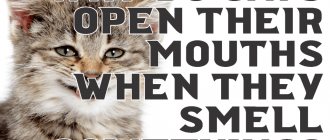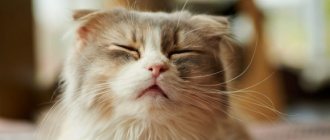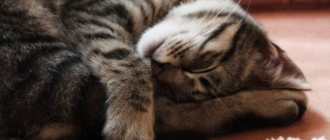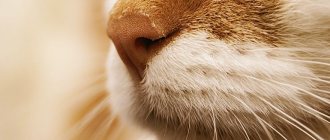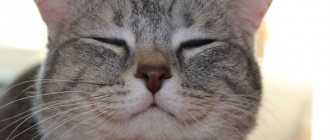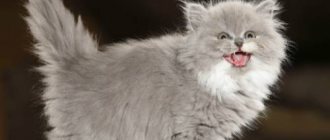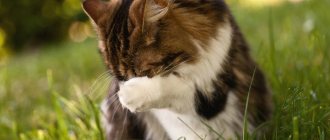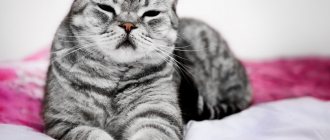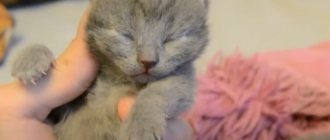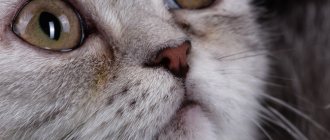Cats are extremely curious - they walk in and around the house, exploring everything that comes along the way. Their excellent sense of smell allows them to navigate their surroundings and receive information about other animals.
From time to time, you may notice how, after sniffing an object, your pet leaves his mouth open for a few seconds. He also wrinkles his nose and raises his upper lip (usually people do this when they smell an unpleasant odor). However, after the initial sniffing and grimacing, the cat may fall into a trance-like state. From a human point of view, the animal's behavior looks very strange.
What's really going on? Does the cat have an aversion to the smell, is she traumatized, or is the reason for something completely different?
It turns out that sniffing with an open mouth is caused by the so-called Flehmen reaction (smile) and is a completely normal phenomenon. Inside the cat's mouth, on the palate behind the teeth, there is a vomeronasal organ (also known as Jacobson's organ). It is small in size and consists of two fluid-filled sacs connected to the nasal cavity. By leaving the mouth open after sniffing the object, the animal draws in air, which enters the vomeronasal organ, and examines the aroma more carefully. This information enters the brain. Thanks to its specific olfactory system, cats are 14 times more sensitive to odors than humans. Additional sniffing allows pets to form a more complete picture of the world around them.
Jacobson's organs
Jacobson's organs, or vomeronasal organs, are located between the roof of the mouth and the nasal septum. The Jacobson's organs are connected to the hypothalamus in the brain, which serves as a kind of switchboard for sending information to other areas.
Read also: Why do you get tired out of habit?
Tiny ducts connect them to the openings behind the cat's teeth in the roof of the mouth.
The Jacobson's organ is named after Ludwig Levin Jacobson, the Danish physician who discovered it in 1811. Cats are not the only animals with Jacobson's organs. Oddly enough, even people have them.
According to Dr. Anne-Marie Helmenstein, although humans do not exhibit the Flehmen reaction, recent research has shown that the Jacobson's organ, like those of other mammals, detects pheromones and tastes low concentrations of certain non-human chemicals in the air.
Main causes of heavy breathing
The normal respiratory rate of tailed cats varies from 30 to 60 breaths per minute, with large and old cats inhaling less frequently than small and young cats. But there are situations when a pet’s breathing is disrupted.
Strange face of a cat
All the reasons why a cat breathes heavily and opens its mouth slightly are divided into physiological (they are not symptoms of the disease and depend on external influences) and pathological.
The first arise under the influence of several external factors:
- high air temperature indoors or outdoors;
- prolonged physical activity (active games, fast running, jumping), especially in animals suffering from obesity;
- emotional experience (joyful or, conversely, stressful state) of the animal.
For your information! If one of them occurs, soon after it is eliminated, the pet’s breathing will return to normal. In this case, you shouldn’t worry too much, but you still need to watch the cat for a while.
A cat's rapid breathing during pregnancy and childbirth will also be considered normal. The reason for this is hormonal changes in the body.
Respiratory system
If all of the above reasons do not apply, you need to urgently take the cat to see a veterinarian, most likely he is sick.
There are many different diseases that can cause a cat to breathe with its mouth open. The most common of them are:
- hypoxia;
- cardiovascular diseases;
- allergic reaction;
- oral diseases;
- respiratory dysfunction;
- entry of a foreign body into the respiratory tract;
- presence of helminthic infestations;
- rib fractures;
- drug poisoning;
- anemia.
Below are more details about the main ones.
Fever
In this case, the cat breathes like a dog, since this is the only way to escape the heat. The thing is that the furry body does not have sweat glands. When a cat exhales hot air and then fills its lungs with cool air, it cools down from the inside.
Note! If your pet has suffered heatstroke, you should not hesitate to provide first aid. You should put the cat in a cool place (for example, in the shade or on a cold tile), then gently wipe it with cold water or apply compresses and give a small amount of water. A mandatory step after the procedures is a visit to the veterinarian.
Joyful mood
When a pet is in a happy mood, its breathing quickens. A similar breathing failure occurs when the animal experiences severe fright or stress.
Hypoxia
Hypoxia is an insufficient amount of oxygen in the organs and tissues of the body. Oxygen starvation has two forms - acute and chronic. The first occurs due to massive bleeding, acute heart failure, thromboembolism, stroke or traumatic brain injury. The second is a result of abnormalities in the functioning of the respiratory and endocrine systems, as well as diseases of the liver and blood.
Heart failure
This disease makes itself felt immediately after the end of the animal’s active movement. In this case, the cat not only breathes like a dog, but accompanying symptoms appear: cyanosis of the tongue, severe shortness of breath and cough. There are times when the patient begins to foam from the nose and mouth.
Note! There is a breed predisposition to heart disease. Often, these ailments affect cat breeds such as Maine Coon, Oriental, Sphynx, and Scottish Fold.
The most dangerous heart pathology for a kitten is hypertrophic cardiomyopathy. It is difficult to detect in the initial stages, since owners often mistake the first symptoms of the disease, such as long periods of sleep, inactivity and avoidance of play, with the breed characteristics of the animal.
For your information! The acute form of the disease leads to pulmonary edema. The animal dies almost instantly.
Allergy
Cats, like people, can experience allergic reactions. Often, with acute allergies, they experience heavy breathing. In this case, the mustachioed’s breathing becomes shallow, accompanied by a dry cough with a paroxysmal character.
For your information! In medicine, rapid shallow breathing in both humans and animals is known as tachypnea. It is also called "breath of the hunted beast."
When a cat has tachypnea, he often sneezes, this indicates that a foreign object has entered his nose. Clear snot may flow from the nose, and tears may appear from the eyes. If a foreign body gets into the kitten's throat, in addition to difficulty breathing, there will be severe salivation. Sometimes the unfortunate animal develops gag reflexes, difficulty swallowing, and may wheeze.
When infected with lungworms, a cat will not only open its mouth and breathe frequently, but also lie down most of the time, refusing not only to run, but also to walk. Such a pet has a dry cough, as well as deep shortness of breath.
Rib fractures and various spinal injuries also lead to abnormal breathing. The animal, gasping for air, tries not to use the chest and breathes with its stomach. Associated symptoms are shortness of breath and acute pain, increased heart rate, the presence of bruises and wounds, and a constant desire to sleep.
If a cat suddenly accidentally swallows medications or household chemicals that are dangerous to his health, his breathing will likely become difficult, he will begin to drool, his pulse will be impaired, and vomiting and diarrhea will begin.
Progressive anemia is a dangerous disease that occurs due to a drop in hemoglobin levels in the blood. The pet opens its mouth while breathing, and also gets tired quickly, is constantly cold, refuses to eat, and sits absolutely indifferent.
The main sense of cats is their sense of smell.
While most people's primary sense is sight, cats' primary sense is smell, including that of humans. In fact, most cats identify their owners by smell, so it makes sense that most cats enjoy sniffing their owner's mouths since the owner's mouth will emit a strong, unique scent that their cat will associate with them.
Cats are believed to sniff their owner's mouths when they are comforted by the unique scent of their breath. So if you come home from work and find your cat climbing onto your lap and trying to smell your mouth and saliva, you should be flattered as your cat has obviously missed you and wants to feel comfortable being in your presence.
Tongue protrusion when feeling normal
- Kittens may stick out their tongues when they are very tired after playing or a day full of different experiences. The protruding tip of the tongue indicates that they are tired and want to sleep.
- The tongue may stick out from behind the mouth when the cat is relaxed or sleeping. When an animal is in this state, this organ becomes slightly elongated and may not fit in the mouth.
- Rapid breathing, which appears in a pet after games, a long run and other vigorous activity, contributes to the desire to stick out its tongue. This promotes active saturation of tissues with oxygen.
- This way the cat can escape the extreme heat. This is explained by the fact that the pet does not have sebaceous glands, like humans, and it somehow needs to protect itself from overheating.
- Expressing emotions during play or other activities. A cat can express its attitude towards something this way or simply tease its owner. If this behavior has already become a habit, then there is no need to worry. The alarm should be sounded if there is a suspicion of a certain disease.
Why does a cat open its mouth when it sniffs?
Cats usually breathe through their nose and open their mouth only for something specific: to eat, drink, meow or bite someone.
But one day you notice that your cat is sniffing something, and then freezes, his mouth slightly open. You might think this is an expression of surprise or disgust. But in fact, there is a simple scientific explanation for this behavior.
Content
Why does a cat's mouth always remain open?
In a normal state, a healthy cat breathes through its nose, and opens its mouth only to meow, wash itself, bite or eat. If your pet regularly looks at you with its mouth open, you need to find out what is the reason for this behavior.
At the beginning of the article, we will take a short excursion into the physiology of cats.
As you know, cats have practically no sweat glands on their skin (except on the pads of their paws, and we can sometimes observe wet paws), so the excretory system in such animals works differently than in humans. Drainage from the eyes and ears begins, periodic but constant diarrhea and vomiting develop, and so on. In particular, shortness of breath may begin - chest or abdominal type. In addition to cases where the problem lies in the nasal cavity or in the oral cavity itself, an open mouth and breathing through the mouth is a protective-compensatory reaction of the body.
It is quite easy to diagnose the problem if a cause-and-effect relationship is visible: too hot weather or stress, travel by transport. In this case, the animal’s condition usually does not cause concern. It is more difficult if the symptoms appear suddenly and irregularly, or the owner simply does not pay attention to them for a long time and comes to the doctor when the disease has gone too far - complications appear, bad breath, severe salivation (salivation).
Possible causes of a cat breathing through its mouth
1. Diseases of the nasal and oral cavity: polyps, oronasal fistula, cleft palate, trauma, foreign bodies, periodontal and dental diseases, acne on the chin, mucosal ulcers due to infectious diseases and metabolic disorders. The mucous membrane is especially “burning” in cats that have been diagnosed with kidney problems or urolithiasis - this is again due to the characteristics of excretion.
2. Diseases of the respiratory and cardiovascular system: asthma, bronchopneumonia, pericarditis, myocarditis, trauma (diaphragm rupture), pleurisy, heart defects, neoplasms.
3. Non-communicable diseases of other organs and systems: tumors, injuries, acute dilatation of the stomach, crash syndrome, heat/sunstroke, pulmonary edema, cerebral edema, poisoning.
4. As a compensatory-adaptive mechanism during childbirth, stress, high temperature, physical activity.
5. Helminthiases with a development cycle through the lungs.
6. Congenital pathologies of the chest, trachea, heart.
We carefully study the pet
What should the owner pay attention to if he notices such a feature in his animal as breathing with an open mouth? Veterinarian at home 24 hours a day.
The cat should be observed for several days unless there is a clear threat to life. Answer yourself these questions:
- How often does this type of breathing occur?
- What could it be connected with, in your opinion?
- Does breathing appear after physical activity or at rest? Night or day?
- Is this type of breathing accompanied by coughing or vomiting?
- What is the general condition of the animal? Does the cat play, eat, drink, go to the toilet regularly or not?
At your appointment, your veterinarian may offer you a fairly long list of necessary tests, since you will need to rule out many diagnoses before getting to the truth.
For one of my patients, we searched for the cause of the cough for several months, going through all possible and impossible examinations... Diagnostics
So, if you go to the doctor complaining of open-mouth breathing, be prepared to be prescribed:
- clinical and biochemical blood test;
- consultation with a veterinarian-dentist;
- X-ray;
- Heart ultrasound and ECG;
- PCR for viral and infectious diseases that may be accompanied by such a symptom (for example, mycoplasmosis, chlamydia, herpes, rhinotracheitis);
- rhinoscopy and bronchoscopy;
- additional consultations with a veterinary surgeon and oncologist.
It would seem that the list is very large! In some medical institutions, people are not so meticulously checked... However, among the readers of the article, the majority are responsible, serious people who will always take care of their pets and support them during illness.
Tartar
In fact, tartar is the same plaque, which is a colony of microorganisms that has only undergone calcification. It is quite strong and hard, has a brownish tint and is capable of growing.
Symptoms:
- Finding dark yellow or brown growths on your cat's teeth.
- The appearance of bad breath.
- Bleeding and inflammation of the gums.
- Soreness may appear, the cat may begin to eat poorly, or even lose its appetite.
Treatment:
1. Grinding of teeth with a special paste. Used at the initial stage of the disease.
2. Tartar removal: mechanical or ultrasonic.
============================================================================================================================================================================================
What is the site Popcat.сlick about the Pop Cat meme. Internet users compete to see who can click on the cat the most
Residents of Asia learned about the site Popcat.сlick, where you need to click on the Pop Cat meme cat so that it opens and closes its mouth, and they organized a competition. Users from Thailand, Taiwan and Malaysia are trying to beat each other in total clicks, and viewers watching the confrontation are creating memes about the unexpected battle for supremacy.
In November 2021, the Pop Cat meme, in which the cat opens and closes its mouth wide, went viral on social networks. In the popular video, the animal is edited to make a sound similar to a “boop” or “pop.”
A month later, University of Sheffield students named Josh, Ed and Freddie launched the website Popcat.click. When visiting this web page, users click on the image of the cat, and the cat opens its mouth and makes a sound - exactly the same as in the original meme.
Using the service, you can not only calm your nerves, but also compete with users from other countries. When a person visits a website, the system reads his IP address and determines what country he is from. After which, all clicks from the user’s personal counter are sent to the country’s general treasury.
Screenshot from the site popcat.сlick
Popcat.click initially went viral in Brazil - in February 2020, users from this country collectively collected a million clicks, writes Know Your Mem. The meme cat and the resource gradually gained popularity around the globe, and in mid-August 2021, residents of Asia learned about the site.
Moreover, serious competition has begun between some social network users from Asia: representatives of Taiwan, Thailand and Malaysia are trying to ensure that their countries are at the very top of the table.
At the time of publication of the text, the first place is confidently occupied by representatives of Taiwan - with their joint efforts they managed to collect 104 billion clicks. In second place is Thailand, which has 90 billion “boops,” while residents of Malaysia still have bronze with 18 billion clicks.
Russia currently ranks 24th with 367 million clicks.
Leaderboard
And while some netizens are trying to win the palm in “boops” for their country, others are watching this from the sidelines and making memes. A Twitter user with the nickname WhitePorridge_ showed what was happening on Popcat.click using a video of buses.
Twitter user XIM also found the competition funny. The guy presented with a concrete video example how Thailand bypassed other countries and approached Taiwan.
A Twitter user with the nickname syok_malaysia also focused specifically on Thailand in his meme. It seems that users from this country were among the outsiders until recently.
Interesting fact: Twitter user middlechildddd noted that North Korea is only one click away.
And some meme models guess who left the “boop” for the DPRK.
Previously, Medialeaks talked about another cat named Styopa, who became a meme thanks to his owner. The pet in the video listens to a chanson and makes a sad face, making the audience fall in love with it.
A baby elephant from Thailand also captivated social media users. He was caught eating sugar cane, but the animal hid so much that it ended up in memes.
Why does a cat chew and lick wool sweaters?
What is the reason for strange cat behavior?
This actually happens periodically. Some owners suggest that the cat simply lacks some nutrients that it finds on the surface of the owner's sweater. However, scientists say that most likely the reason for such actions lies in something else. Some cats just have an impulsive urge to chew, suck, or lick things. In most cases, these are woolen items, however, some individuals prefer human hair, shoe laces, cardboard or plastic bags. And if your cat eats a high-quality diet, if she exhibits high energy levels, and if she has a shiny coat and healthy skin, then it is very unlikely that the behavior is due to nutritional deficiencies. However, certain medical conditions, such as diabetes or anemia, can cause this behavior. Therefore, if your cat begins to lick or chew sweaters, it would be a good idea to take her to a veterinarian, who could give an accurate answer to the question about the suspected health problems.
Why does my cat sleep with his tongue hanging out?
Contents hide
Before you, dear readers, is another article from the “Cat Oddities” series. Cats often present various behavioral riddles to their owners. What to do, how to behave? Should you run for the camera, take a few pictures and quickly post them on social networks? Or urgently call the veterinarian and ask for help? Many situations are such that you can’t figure it out right away. It looks funny on the outside, but in reality you have to cry.
So, your mustachioed pet has begun to stick out its tongue more and more often. Previously, he did this strictly “on business” - when he needed to drink or wash. But now the pet has already begun to fall asleep, sticking out its tongue. Or he often sticks out the tip of his tongue for no apparent reason. Let's figure out what's going on.
By the way, over the past year or two, the English-language segment of the Internet has been enriched with a new word – “blepping”. It just means the cat briefly sticks out the tip of its tongue - for a minute or a little more. The resulting look, as young people say, is quite “cute” - just right for Instagram. You look at the cat and think - why did you stick out your tongue? And how can I politely tell you to put it back? But we must always remember that cats don’t do anything “just because.” By sticking out its rough tongue, the animal can, for example, explore the surrounding odors much better.
“Flehmen-smile” and Jacobson organ. Purrs owe their hypersensitive sense of smell to a special vomeronasal organ (also called Jacobson's organ). When a cat needs, for example, to “feel” the food offered to it, it seems to freeze with a characteristic expression, as if mocking and even smiling. Experts call this behavior the “flahmen reaction” or “flahmen smile.” The cat's lips curl slightly, the mouth is slightly open, and the tongue "tickles" the roof of the mouth. Not even a minute passes before the cat finds the exact answer to the question: edible or inedible.
In addition, everyone has probably heard about the famous sixth sense of cats. Some researchers suggest that cats owe their famous intuition to Jacobson's organ. During the “flehmen smile,” two small salivary ducts open, located on the palate behind the front incisors and communicating with Jacobson’s organ, which at this moment functions as an auxiliary olfactory organ. This does not happen automatically, not reflexively. The cat itself “consciously” passes air through Jacobson’s organ. Some scientists believe that we are dealing with something between the senses of smell and taste.
The animal relaxed. But we were just talking about a waking animal. It’s a completely different question when the pet is sleeping soundly, and there can be no talk of connecting the Jacobson’s organ. However, we would venture to assume that the cat fell asleep very soundly and simply relaxed. We humans also sometimes look quite comical during sleep - let’s be honest. The facial muscles relax, the mouth opens slightly. Your cat is fed, satisfied and happy. So he stuck out his tongue because of a calm and deep sleep.
When can you talk about problems? Alas, it’s not without problems either. Perhaps something is bothering the cat in the mouth - for example, there are food particles stuck between the teeth that cause some discomfort. You and I have the opportunity to use a toothpick or dental floss, but there is no one to help the cat. And in this case she can stick out her tongue. This, by the way, is the most innocent thing that could happen.
And so your pet’s mouth may be quite neglected, old dental problems have appeared. Periodontal disease, caries, plaque, tartar. Inflamed gums or toothache cause discomfort, so the cat instinctively opens its mouth and sticks out its tongue.
Overheating and heatstroke. Also evaluate current weather conditions. Perhaps the pet opened its mouth slightly in extreme heat. Cats don't sweat the way we humans do. They cool the body through their paw pads and also by licking - evaporation reduces the risk of overheating. If the cat is very hot, then it opens its mouth and sticks out its tongue - much like dogs do.
The tongue is swollen. Something similar happens when a cat eats something toxic, or when she is bitten on the tongue by an insect. A cat is physically unable to “remove” a swollen tongue into its mouth – this should be kept in mind. Examine the tongue itself, as well as, if possible, the mouth - it is possible that the pet has breathing problems.
Cats of brachycephalic breeds. “Peaches” and other brachycephalic breeds, due to their anatomy, can stick out their tongues. Everything is explained simply: the tongue is sometimes cramped in its place. In most cases, the animal is fine, but you should still keep an eye on it. If your pet is experiencing noticeable difficulty breathing, it is best to consult a veterinarian.
Now you, dear friends, can imagine what “blepping” is in a cat’s understanding of the issue. Your comments, as always, are welcome. And funny photos with pets sticking out their tongues are doubly welcome!
Material used: Why Does My Cat Always Fall Asleep With His Tongue Out? Author: Vanessa Salvia. Source: cuteness.com Photo: unsplash.com
The cat pulls out hair
Sometimes the cat just plays by pulling your hair, which can be quite painful. In this case, you must give a tough rebuff, because if you ignore it, the pet will get used to it and will continue to torment you. In this case, you need to shush the cat, hiss, tell him a forbidding word, or, ultimately, kick him out of bed.
You can do the following experiment: as soon as the cat starts making pretzel tricks with your head, he needs to forbid it with words, but if he doesn’t listen, kick him out of the bedroom. After a few times, he will develop a conditioned reflex that playing with his hair will be followed by being completely removed from your body. Then, perhaps, some time will pass and the cat will stop hurting you, understanding the consequences.
Animal Treatment Options
In most cases, the best option would be to urgently hospitalize your furry. There is no need to try to cure a tailed cat at home. By trying to help the poor cat on their own, the owners are only stalling for time and making the situation worse.
After giving birth, a cat often breathes with its mouth open
Contacting a veterinarian
When contacting a veterinary clinic with complaints of unnatural breathing of a pet, the doctor will prescribe the following tests:
- ECG of the heart;
- Ultrasound of the heart;
- blood test (general, biochemistry, for infections: herpes, rhinotracheitis, etc.);
- fluoroscopy;
- consultation with veterinarians: oncologist, dentist and surgeon;
- bronchoscopy;
- rhinoscopy.
The list of studies is impressive, but despite this, loving and responsible owners will do everything necessary to ensure that the four-legged disease is diagnosed on time. This will increase the chances of a speedy recovery for your pet and its return to its former carefree cat life. Therefore, at the slightest suspicion of illness in your tailed friend, you must call a doctor at home or take the cat to the hospital.
Note! An exception is if a foreign body enters the nasopharynx. In this case, you need to save your pet very quickly. If you know the sequence of actions, even a person without a medical diploma can help an animal.
If a foreign object is stuck in your pet's nose, to provide first aid you need to open the cat's mouth wide, then pull his tongue and try to stick the object out with tweezers. If he ends up in the trachea, you need to follow these steps: turn the cat over, then lift him by the hind legs and gently press his stomach in the diaphragm area. After such manipulations, the foreign object should jump out. But if this does not happen, the cat must be urgently transported to the veterinary clinic.
Flehmen reaction and urine markings
A pet exploring the space around the house with its mouth open is most likely “collecting” the smells of other animals. Because Flemen's smile often appears when sniffing urine; it is quite possible that someone else's cat has left its marks near your home.
When members of the cat family make urine marks, they explain to their relatives that the territory belongs to them. The desire to mark objects is typical for non-castrated cats, which thus communicate their readiness to mate. Animals that are stressed or anxious may mark furniture; it gives them a feeling of security because... the smell scares away strangers and reminds you of being in a familiar place. A change in the environment in the house, a move, or the arrival of a new family member can cause a negative psychological state in a cat.
If your furry friend often relieves himself in the wrong place, ignoring the litter box, you should contact your veterinarian; Your pet may be suffering from urinary problems associated with some medical condition.
What odors trigger the Flehmen reaction?
You may have noticed that your cat doesn’t show a strange “facial expression” after every sniff. The fact is that not all objects and parts of the house are subject to additional examination. The function of Jacobson's organ is to recognize pheromones - chemical substances secreted by animals to communicate with relatives. Secretion is carried out through glands located on the face, paws and anus. With the help of pheromones, cats declare their territorial rights, leaving marks for neighbors and strangers.
Flemen's smile usually appears after sniffing the urine and excrement of other animals, because... they contain pheromones. Also, these substances can remain on furniture and even on people. Additional sniffing allows males to identify a cat that is ready to mate, and mother cats to track the path of the cubs.
Furry members of the household often rub their faces against household items to leave their pheromones on it. For a cat, these substances are indicators of calm and awareness; In this way, the animal reminds itself and tells its relatives that this place is safe. For the same purposes, pets can scratch things.
Flehman's reaction to other animal species
Unless you are a zookeeper or regular visitor to a sanctuary, your cat's first reaction to the smell of fleas will likely be quite surprising. However, domestic cats are not the only species that can curl their lips when a certain smell piques their interest. Other species that have this ability are also known:
- Horses
- Buffaloes
- Giraffes
- Hedgehogs
- Pandas
- Tigers
- Rhinoceroses
- Hippos
- Llamas
In the animal world, this flea reaction would not exist if it were not for scent communication. All of the above animal species send chemical messages (pheromone deposits) when they urinate in an open space. This “marking” behavior allows animals to signal that they are ready to mate or claim a certain territory. The emerging flehmen is a way to “read” the signal.
Despite this common reflex and the ability to communicate through smell, scientists have yet to determine whether the flemen response is cross-species. That is, can a cat, for example, dissect and understand the pheromones of a panda (or a tiger and a rhinoceros). Although this skill has no evolutionary purpose, it would be interesting.
Alarming symptoms
If the cat is healthy and breathes with a half-open mouth during extreme heat outdoors or indoors, after long active games, as well as during periods of emotional distress, other alarming symptoms will not appear. At the same time, the pet’s tousled fur, enlarged pupils and “pistol tail” do not count. They only confirm that the cat is worried about something, tired, etc. Very soon everything will pass, and he will breathe through his nose again.
The dog breathes frequently and heavily with his mouth open and his tongue hanging out
If there is pathology, there are accompanying symptoms.
Alarming symptoms
Signs indicating the need for medical care for an animal include:
- rapid breathing with the mouth slightly open, abdominal inhalation;
- hoarseness, unusual for a cat;
- loss of appetite;
- decreased activity, apathetic state;
- vomiting, cough;
- unnatural posture;
- anxiety and fear;
- strong thirst;
- change in color of the mucous membrane (pallor, cyanosis).
Note! If any of the symptoms appear after the pet has exercised, it must be urgently sent to a veterinary clinic.
Thus, when a cat sticks out its tongue and breathes frequently, this is an alarm bell for every owner. The frequency of respiratory movements does not always return to normal without outside help; often this behavior of a four-legged pet is a sign of many serious diseases that require immediate attention from a veterinarian. The owner will do a great service to his pet if he pays attention to the mustachioed’s abnormal breathing in time and begins to act.
Video
Why are cats attracted to specific smells?
Attentive owners of furry pets may have noticed that cats show special interest in smells that are unusual, in human opinion. For example, cats love the smell of dirty clothes, unwashed socks or sweaty armpits. Thus, some kittens and adult pets like to sleep on unwashed linen, put their muzzles in shoes or enjoy “poking” into the armpits, while preferring more male ones. What causes this behavior, why do cats lick their armpits?
First of all, don’t be scared and think that your pet has gone crazy. The thing is that representatives of the cat family have a much better developed sense of smell than humans. Cats can detect odors and aromas that are not sensitive to our noses and at the same time feel them much more strongly.
Through new scents, cats navigate in space and adapt to environmental conditions.
Smells can attract or, conversely, repel cats. For example, cats simply adore human sweat. Animals like the smell of their owner's clothes and shoes. It is worth noting that such “scents” attract more adult cats than kittens. Babies show less interest in strong aromas and use their owner's clothes or socks as new toys.
Heat
The main physiological reason why a cat sticks out its tongue is temperature regulation. The animal protrudes the organ to reduce discomfort, for example, during heat. This prevents the development of heat stroke. In this case, the owner should take the cat to a cool place and pour water on it.
But a cat's tongue sticking out can also be a signal of high body temperature. To understand whether your pet is suffering from heat or is sick, you need to figure out what temperature is considered normal in cats.
The normal temperature for a cat is 38-39 degrees. But don’t panic right away if the indicator deviates slightly from the norm. Here are the common reasons for the thermometer to shift:
- immediately after sleep, the thermometer drops by a couple of divisions;
- in the evening the cat’s body temperature will be higher than in the morning;
- Kittens have a slightly higher temperature than adult animals.
What is the Flehmen reaction?
The unusual smelly face your cat makes after sniffing something has a name: the Flehmen reaction. The word "flehmen" is translated in various German languages as "to look evilly" or "to show the upper teeth." Let's see what this strange growl looks like and how it works.
What does Flehmen's reaction look like?
With a notorious reputation for being vicious and completely unpredictable, cat owners believe this unusual feline face is more devious than anything else, using descriptions such as:
- grin
- grimace
- lip arching
- grin of the mouth
- Smirk
The fleaman's reaction is not sinister, and your cat is certainly not plotting anything bad against you. When the flea reaction occurs, the cat arches its upper lip upward, wrinkles its nose, exposes its front teeth, inhales deeply and clicks its tongue.
This goofy expression usually lasts a few seconds (or as long as the strong inhalation lasts), but some cats hold their mouth open a little longer - almost as if they are choking or out of breath.
How does the Flechman reaction work?
It's no accident that your cat's mouth opens when she sniffs near the litter box or in a grassy area in the yard. This Flehman reaction links to (and further enhances) the cat's strong sense of smell. Here's what the process looks like:
Inhalation
A curious kitty will follow her nose until she finds something that catches her attention, be it a seemingly bare spot on the wall or an empty ceramic bowl after dinner. The cat leans over and “inhales” the scent through its nostrils and mouth. At this initial stage, you will notice a noticeable curl of the lips and exposed teeth - a real flemen!
Clicking your tongue
If you look closely, you'll see your cat sniffing, running her tongue up and down—a bizarre sight. This clicking motion transfers odor from the tongue to the vomeronasal organ (Jacobson's organ), located in the roof of the mouth.
Small canals located behind the top row of teeth connect to the brain, allowing the cat to decipher what that strange smell might indicate.
Analysis
We recommend viewing
Why do cats change their sleeping places? Why do cats get in your face while you sleep? Why do cats act strange when you scratch the base of their tail?
Drawing the aroma into the mouth and vomeronasal organ almost doubles the sensory experience. While a cat's taste buds are significantly delayed, its sense of smell can be 14 times more powerful than a human's.
Thanks to the flechman response, a cat can accurately "sense" another cat's pheromones or other mysterious scent by redirecting this sensory response to reliable olfactory receptors.
Are you still a little curious about your cat's mysterious "stinky face" and why cats make it? The Jackson Galaxy video below will help you understand this strange feline behavior a little further:
Features of breathing in cats
It’s worth starting with the fact that among the reasons why cats switch to this type of breathing, there are physiological ones, that is, those that are normal and pathological ones, caused by various diseases.
One of the cases of physiological mouth breathing in cats on video.
But, of course, this is rather a pleasant and funny case when a cat breathes with its mouth open. But this is not always the case. Mouth breathing, caused by physiological reasons, usually does not last long, immediately after oxygen saturation, the body returns to normal mode. Happens when:
- High ambient temperatures are more common in long-haired and plush breeds.
- And also after intense physical activity, especially in cats with severe obesity.
